This UK based family company started to develop and manufacture a agrochemical water treatment plant 23 years ago and called it Sentinel. "The plant removes pesticides, organic and in-organic pollutants from water easily and affordably." It benefits many crop spraying industries and the bulk of their business is with arable farmers, then flower/cuttings/plant growers and in viticulture.
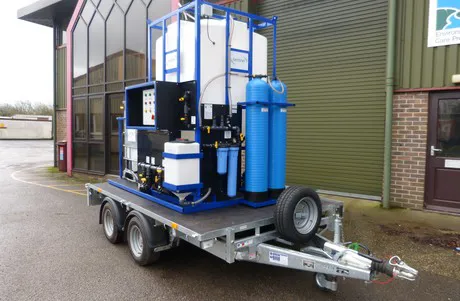
Trailer mounted, one for a pesticide manufacturer in New Zealand.
Increase in Kenya and Uganda
In the floriculture industry, they have seen the demand for these plants increasing, particularly in Kenya and Uganda. In these areas, they now have many plants that are treating water from large growing operations. "Growers essentially discovered that they were contaminating their own irrigation water source with pesticide and organic/in-organic metals from their spraying operations to the detriment to their crops. Responsible growers took action and sought out a technology to stop the cycle of pollution for the benefit of the environment and the crops that they produce."
But before this time they already had plants in the area with a very large TNC whose environmental policy states the use of the Sentinel as the only acceptable method of agrochemical water treatment. "A few growers had seen our plants in action and sought us out."
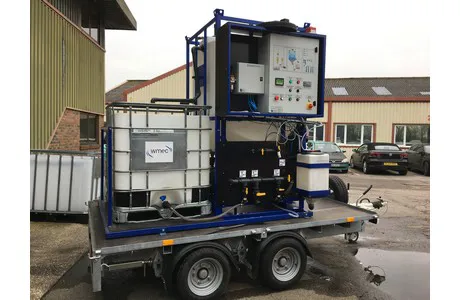
Plant Sentinel 200, sent to Guyana Sugar last year.
Water - a precious resource
Also in the rest of the world, they have seen an increase in demand for water treatment systems, particularly in industries that spray crops. "Water is becoming a very precious resource and one that is now recognized as needing protection and conserving more now than ever with a change in many laws being actively enforced regarding the discharge of contaminants into the environment. In industries that spray crops, any waste from washing out or unused products can be safely treated in the Sentinel and the treated water can be recycled or returned to the environment safely. This obviously stops pollution from occurring, can potentially save initial water purchase costs as its recycled, and can save on disposing of the contaminated water through a contractor."
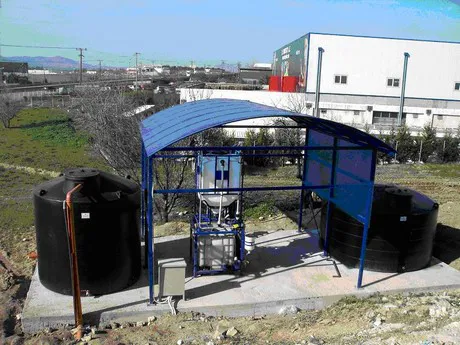
Plant with the treatment tank on top with Nestle in Greece treating waste from coffee production
Why Sentinel?
Why should a grower choose the Sentinel? "The Sentinel is often chosen as it is a proven piece of technology, with independent lab trials and regulations naming it as the preferred disposal method. It is an approved product of the World Bank and European Union. On top of that, as it treats at the source, the contamination is dealt with immediately, rather than a system that delays treatment or is ineffectual. It is a very versatile plant that can treat herbicides as well as pesticides, and can easily remove heavy metals from water. Treating in batches from 250 – 2,000 litres there is a Sentinel sized for any site."
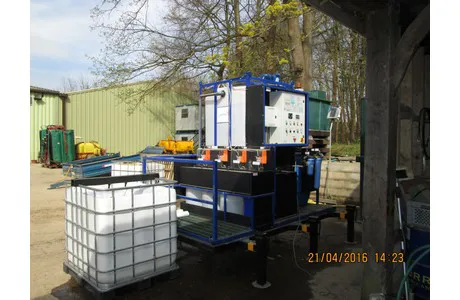
A plant at a vineyard (Nyetimber wines) on a special adapter frame that a trailer can be driven underneath it to pick it up and move to the field sites.
Payback period
According to Smith, the payback period is variable. "But many customers who were initially paying for disposal cover the cost of the plant within one growing season. For others the payback is immediate as they could be facing hefty fines and facing legal action." However, there are also growers for whom their environmental responsibility is top priority. "They purely have the desire to do the right thing and to be environmentally responsible – indeed one customer has treated 3,000,000 litres of contaminated water through a standard Sentinel that cost £40,000 in three years and returns all of it to the local environment."
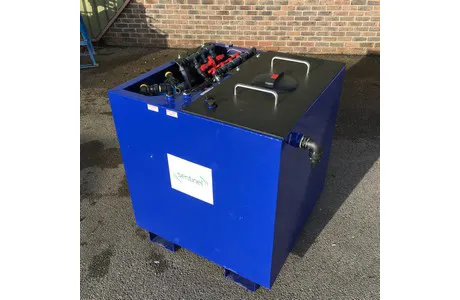
The little ‘box’ which is the size of an IBC and treats 250 litres at a go. It can fit on the back of a pick up truck.
Outlook future
For the future, Smith expects and hopes to see that water treatment will become the norm rather than a requirement. "We owe so much to the environment, it provides us with food and resources. With the ever greater demands we place upon the land we need to protect it, and we are nothing without water. Clean water is becoming a scarce resource in some countries and we are finding large growth in areas where drought is a concern as to be able to recycle water and prevent pollution is invaluable."
For more information

Sentinel
Nicola Smith
Email: nicky@wmec.co.uk
www.sentinelplant.com
